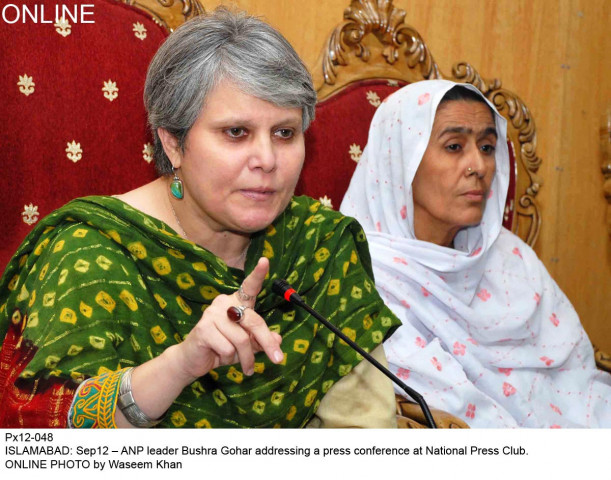International women human rights defenders day: Going the Gohar way
Fighting for rights in a male-dominated Parliament, ANP MNA speaks of uphill journey to empower women.

Parliament may well be the custodian of the Constitution and a forum to protect citizens’ rights, yet it has failed to safeguard rights of 48% of the population — women. Although a number of bills relating to women’s rights have been tabled in Parliament, it has yet to pass them.
“We worked hard to get a bill on domestic violence passed, but faced severe resistance on the floor of Parliament,” says Bushra Gohar, a member of the National Assembly from Awami National Party (ANP).
“I don’t understand why our religious parties are opposed to women gaining security within the boundaries of their homes,” the tough-talking parliamentarian from Khyber-Pakhtunkhwa says, contesting the stance Jamiat Ulema-e-Islam-Fazl (JUI-F) took against the bill.
Taking the lead
With her father an active member of the National Democratic Party (NDP), a predecessor to ANP, politics came naturally with her. However, that never meant smooth sailing for Gohar, who entered parliamentary politics in 2008.
“Women were not part of important committees and commissions. Things were just decided among the men.”
But this wasn’t enough to dampen Gohar’s spirits. “I started off as a substitute member representing my party in special commissions and committees,” she says. “It wasn’t long before other political parties also took the lead and added women to their list of representatives.”
It is democracy, she insists, where everyone is taken along. “It has opened doors.”

Working in the capacity of chairperson of the standing committee on women development, Gohar—one of the few women legislators who have been very vocal on women issues—has done a lot.
During the last five years, she generated debate over bills, including the Domestic Violence Bill, Protection Against the Offence of Women Trafficking and suggested amendments to Section 10 of the Citizenship Act 1951.
“We took up issues like the sexual harassment case filed by Captain Riffat Hayee against senior officials of the Pakistan International Airlines to highlight deep-rooted problems in organisations and society in Pakistan,” she says.
At a standstill
With the devolution of powers under the 18th Amendment, Gohar feels the incumbent government seems somewhat paralysed. “Apart from Sindh, none of the provinces have taken any concrete measures for women’s rights, nor has the government made women’s issues its priority.”
Gohar insists laws help recognise a problem exists, which “makes it easier to review what has been done and further helps in implementation”.

She says, “We do need to work on other fronts including education, economics and politics to empower women.”
“Look at the state of our lady health workers. We need to figure out where our priorities lie,” says Gohar.
“Despite women constituting 48% of the total population, you do not see women in major commissions or committees,” she adds. “Women need to play a more active role in decision making.”
She also feels a little disappointed with the role the media and civil society have played so far. “Why are women parliamentarians only highlighted for their clothes and bags; they should be encouraged for the work they do in Parliament”.
Gohar, however, sees light at the end of the tunnel. “Women have worked hard and gained recognition in various fields over the period of time. It is an ongoing process which has improved with struggle.”
You can read other stories from this series here.
Published in The Express Tribune, November 29th, 2014.



















COMMENTS
Comments are moderated and generally will be posted if they are on-topic and not abusive.
For more information, please see our Comments FAQ